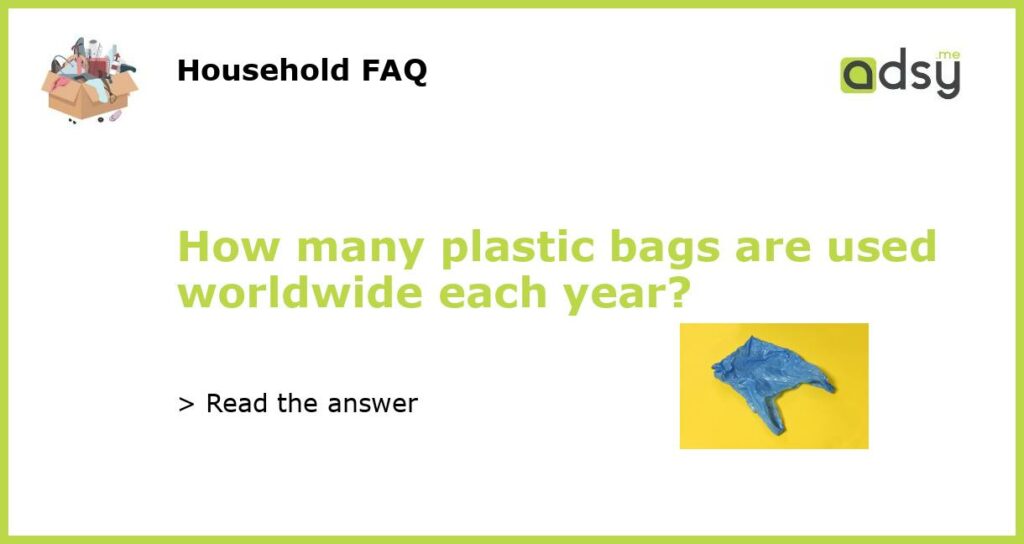Plastic Bags: A Global Environmental Menace
Plastic bags have become an ingrained part of our daily lives, providing convenience and functionality. However, the magnitude of their environmental impact is staggering. Every year, billions of plastic bags are used worldwide, contributing to pollution, habitat destruction, and the depletion of natural resources. Let’s delve into the numbers and uncover the extent of this global issue.
The Global Consumption of Plastic Bags
The exact number of plastic bags used each year worldwide is difficult to determine precisely due to the lack of comprehensive data. However, estimates provide us with a clear picture. It is believed that approximately one trillion plastic bags are used annually across the globe, which means around two million bags are consumed every minute. This massive amount of plastic waste poses a significant threat to our environment and demands urgent action.
A Global Comparison: Plastic Bag Usage by Country
The usage of plastic bags varies significantly from country to country. Some nations have taken measures to reduce their consumption, while others continue to rely heavily on single-use plastic bags. The following countries represent a range of bag usage patterns:
- China: As the most populous country in the world, China leads the global consumption of plastic bags. It was estimated that China used approximately 3 billion plastic bags daily before implementing a ban on free plastic bags at retailers in 2008.
- United States: The United States consumes around 100 billion plastic bags annually, which equates to approximately 300 bags per person per year.
- India: India has the second-largest population globally and is also one of the largest users of plastic bags. The country reportedly consumes around 16.5 million tons of plastic annually, a substantial portion of which is in the form of bags.
- European Union (EU): The EU has taken significant steps to combat plastic bag usage. According to Eurostat, the statistical office of the EU, the per capita consumption of plastic bags in EU countries decreased from 176 bags per person in 2010 to 77 bags per person in 2016.
The Environmental Impact of Plastic Bag Consumption
Plastic bags pose a severe threat to the environment due to their non-biodegradable nature. Here are some key environmental consequences of plastic bag consumption:
- Pollution: Plastic bags not only take hundreds of years to decompose, but they also release harmful pollutants during the breakdown process, contaminating soil and water sources.
- Marine Life: Marine animals often mistake plastic bags for food, leading to ingestion and potential entanglement, which can be fatal.
- Land and Habitat Destruction: The reckless disposal of plastic bags can lead to land degradation and destruction of natural habitats.
- Resource Depletion: The production of plastic bags requires valuable resources such as crude oil and natural gas. The continuous demand for bags places unnecessary strain on these resources.
Addressing the Plastic Bag Problem
The scale of plastic bag consumption and its environmental consequences necessitate comprehensive solutions. Several countries and regions have taken measures to curb plastic bag usage, including:
- Bans and Fees: Many countries have implemented bans on plastic bags or imposed fees to discourage their use. These policy measures have proven effective in reducing consumption and promoting the adoption of reusable alternatives.
- Promotion of Reusable Bags: Encouraging the use of reusable bags is crucial in minimizing plastic bag consumption. This involves awareness campaigns and incentives for individuals and businesses to choose reusable alternatives.
- Waste Management and Recycling: Proper waste management and recycling infrastructure are essential to handle the large volume of plastic waste generated. Efficient recycling processes can help reduce the environmental impact of plastic bags.
- Industry Innovation: Researchers are exploring alternative materials and designs that can replace plastic bags. Biodegradable and compostable bags, as well as reusable options made from sustainable materials, offer promising alternatives.
In conclusion, the number of plastic bags used worldwide each year is estimated to be in the trillions. This excessive consumption has severe consequences for our environment, leading to pollution, habitat destruction, and resource depletion. However, with the implementation of policies, promotion of reusable alternatives, and industry innovation, it is possible to address this global issue and reduce the harmful impact of plastic bags on our planet.






